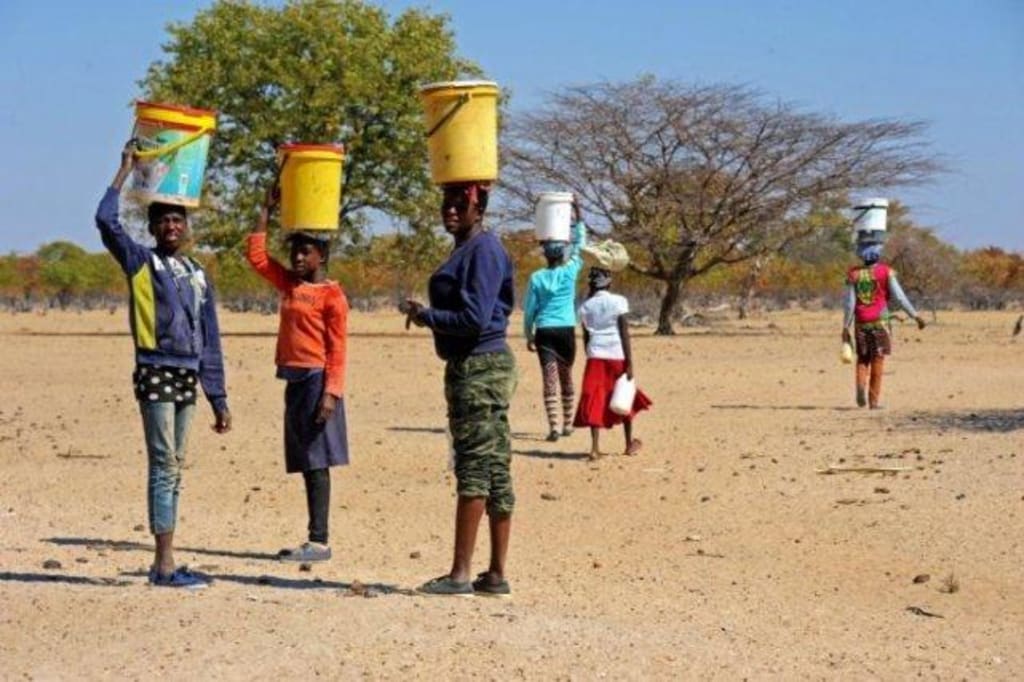Is it that hard to dig a well in Africa?
extremely poor group

Carrying a bucket on their head, walking dozens of kilometers or even dozens of kilometers to find water sources is the main job of some African women and children.
When the dry season comes, fetching water may even be the only part of the day for these people, who set out in the morning and return home with water in the evening.
Because the water source is often in a place where no one takes care of it, the water they get back is cloudy and full of sediment, but these dirty water is all the water for their family and livestock for a day.
Many people don't understand why Africans don't dig wells themselves? Why not just choose to live near a water source?
Why don't Africans live near water sources?
Africa is very famous for its drought. The largest hot desert in the world, the Sahara Desert, is located in northern Africa. The area of this desert alone accounts for 30% of the total area of Africa. The annual rainfall here is less than 22 mm.
With the exception of the Sahara Desert, a tropical desert climate with very little precipitation, the most common climate type in Africa is the savanna climate, which covers more than half of Africa.
The savannahs of Africa support many interesting animals, lions, zebras, giraffes, bison. . . Running and thriving in the grasslands, but this climate type is not particularly friendly to those who have settled down.
Because the most obvious feature of this climate is the extreme dry and rainy seasons. During the rainy season, floods and diseases are everywhere. During the dry season, the water sources dry up, and the animals can only take turns drinking water around a puddle.
Because of this, Africans living in savannah climates sometimes do not choose to live in places close to water sources, because such places are difficult to live in during the rainy season and are prone to spread diseases.
However, it is true that stronger tribes are more likely to develop closer to the river due to the need for farming, it's just that the dry season in Africa is the kind of drought where the entire river dries up.
During the rainy season, the river dykes reduce the risk of flooding and disease for these tribes along the river, where they can happily farm for more food.
However, when switching to the dry season, it is impossible for them to give up the land they have worked hard to cultivate and migrate with the water source, so they prefer to walk far away to get water.
In fact, even if they were willing to follow the water, that would be a more dangerous and unsustainable way of living. Think of how important a waterhole is to animals and people during the dry season in Africa. No African family can keep a waterhole forever or keep it for itself.
Putting all this together, Africans walking long distances to fetch water should be a way of life that has been sifted through a long period of trial and error to best suit them.
But now that technology is so advanced, why don't they dig wells for themselves?
Does Africa have groundwater?
First of all, let's be clear about whether there is groundwater in such arid Africa. The answer is obvious, Africa has very rich groundwater resources.
In 2012, using modern exploration techniques, scientists analyzed the continent's entire aquifer for the first time, and researchers from the British Geological Survey and University College London mapped the continent's groundwater resources in detail.
This time, the exploration scientists have come to a conclusion that the water storage capacity of the aquifer on the African continent is 100 times that of the surface water, but you can also find from the pictures that the place with the most groundwater content in Africa is the Sahara Desert.
In fact, the Sahara Desert was formed not long ago. It was formed gradually due to climate change between 5,000 and 10,000 years ago. It used to be an oasis, and many relics of ancient human activities there have been discovered.
Obviously, the groundwater in the Sahara Desert was stored when it was still an oasis, and after the desertification, no one has developed it, so it has been preserved to this day.
We can also see from the picture that almost all the land in Africa has water under it, but some places have more water and some places have less water.
Virtually every piece of land has aquifers beneath it, water that slowly seeps down from the surface, and the efficiency of aquifers to collect water varies widely depending on the material of its composition.
With some materials, such as sand, the surface water can penetrate down very quickly, several meters in a day, which means that it loses relatively less of the surface at the surface;
And some materials, such as clay and shale, infiltrate the groundwater very inefficiently, maybe only a few centimeters in a century, and if it is close to the ground, it is likely to be directly evaporated.
However, the natural reserves of water in an aquifer vary from place to place, depending on its topography and storage space. The larger the storage space, the richer the groundwater, and the lower the aquifer, the more water can be collected. lots of moisture.
In general, as long as Africans are willing to dig, find the right place to dig down, or dig a few more times, they can basically dig water.
That being the case, why don't Africans dig wells themselves?
In fact, the reason is very simple. Africans who are really short of water are extremely poor groups, and they are basically in places where it is difficult to dig wells to dig out water.
There is a statistic that may surprise many people. About 300 million to 350 million people in Africa live in an environment of extreme water scarcity. It is estimated that these people need to travel dozens of kilometers to find water sources.
These extremely water-stressed groups account for 27% of Africa's total population, but in fact, worldwide, there are about 4 billion people who are extremely water-stressed in January each year - about 50% of the total population, and another 2 billion people live in Areas with severe water shortages - about 25% of the population.
Statistically speaking, Africans living in tropical desert and savanna climates are not as deprived of water as the outside world thinks, because they exploit groundwater.
In other words, it is not that most Africans do not dig wells, but that many wells have been drilled wherever they can, and a large part of the international aid funds are spent on digging wells for them.
In some of the richer places - like South Africa, they have developed too much groundwater, from 1995 to 2015, the groundwater level has dropped by 25 meters, causing some serious geological disasters.
And those who are in extreme water shortages, for various reasons, it is difficult for them to have a reliable well. These include the following:
It is very difficult to drill a well, and it may be hundreds of meters deep into the ground, and there may not be water out. The cost of wells and maintenance is beyond their means, with some parts of Africa believed to cost $33,000 to drill a well and install the pumping equipment.
For these groups, they really can only walk a few dozen kilometers to find water.
at last
We often hear that Africans are very lazy and feel that they are unwilling to dig wells and farm land. In fact, for some areas, it is true that water may not be available for living and irrigation.
The food shortage and inconvenience brought about by water shortage make it difficult for these groups to get out of poverty, and poverty makes them lose confidence, which may be the essential reason for their laziness.
About the Creator
sondra mallen
Share a little bit of science every day






Comments
There are no comments for this story
Be the first to respond and start the conversation.